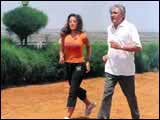 | « Back to article | Print this article |
 Jenny (Perizaad Zorabian) is young, with all the exuberance of her age. She works part-time as exec at a five-star hotel, part-time as a model.
Jenny (Perizaad Zorabian) is young, with all the exuberance of her age. She works part-time as exec at a five-star hotel, part-time as a model.
(Yet, says the film's publicity material, despite being a part of this glamorous world, she has retained her values. Since this is a film review, we won't go too deep into whether the moviemakers assume that people in such professions lose their values, on such assumptions are 'family-value' films based).
| |||||||||||
He is, as judges ought to be, upright, incorruptible, the kind of man who will not accept a towel from someone even when he is sweating bullets because who knows what favour he might have to give in return?
| |||||||||||
He is also as judges probably wish they could be a celebrity, lionised by his peers and fawned over by the younger generation, various members of which fawn on him with all the enthusiasm teenyboppers normally reserve for pop stars, mob him in public places, and queue up for his autograph.
He achieves this iconic status by the expedient of appearing as speaker at a college function and, in response to a question about falling in love (he ignores a dozen other questions before this one comes along, but never mind that), he says, 'The word falling implies a descent, you should rise in love!'
Wah, wah. When he said that, he sounded exactly like Mukta Arts managing director Subhash Ghai, who used that line extensively to promote his earlier Aishwarya Rai-Anil Kapoor starrer Taal. But never mind that, too.
Anyways. The judge's family is worried. Here's this man, who has spent every waking moment of the last 40 years hard at work. Now he is retired, time will hang heavy on his hands, they tell one another. He has to keep himself occupied, they announce.
The family puts its heads together and comes up with the solution: he will go to Joggers' Park!
So he goes to Joggers' Park, and discovers a world he never knew existed. This world comprises sundry people running about, three old men (one of whom a cartoon Sikh is having an affair with his daughter's teachers). And Jenny.
Jenny embarrasses the hell out of His Honour at a restaurant. Jenny talks at the top of her voice. Jenny insists on overruling his inhibitions regarding gifts and gives him jogging shoes because the cloistered judge, in his unwisdom, jogs in canvas sneakers (bad for the ankle, spine, and places west).
Love dawns in the judge's ageing breast and manifests through speaking glances, non sequiturs and SMS messages.
That dawning love blooms into full-fledged troubles, as represented by a couple of young hunks who cannot figure why Jenny is all gooey over the old fogey, and sundry other complications.
Matters finally come to a head. The ultimate choice has to be made between love and the honour of His Honour's family.
I won't spoil the suspense, such as it is, by telling you what he chooses.
The film has to be seen in perspective. When Ghai -- who is credited with the story/concept and dialogues -- spoke to the media in New York, he mentioned two things:
1. This film is the harbinger of a new trend in filmmaking, whereby movies will be made for specially targeted audiences. This one, he said, is for a 'class' audience, defined as city-bred folks who expect more out of a movie than the clichéd rich-boy-poor-girl romances and two-fisted heroes solving the world's problems in half an hour, that are the existing Bollywood staple.
2. As themes go, this one is as bold as it gets. A theme, Ghai said, that has never been attempted on screen before, anywhere in the world.
To take the second point first: I am no expert in international cinema, or even Indian cinema, for that matter.
 But I seem to recall that K Balachander made in Tamil a film called Apoorva Ragangal. In it, the young Kamal Haasan falls for the older woman played by Srividya while his middle-aged father, played by 'Major' Soundarrajan, falls for Srividya's young daughter played by Jayasudha. There was a Hindi version as well, Ek Nayi Paheli, with Kamal and Hema Malini in the lead.
But I seem to recall that K Balachander made in Tamil a film called Apoorva Ragangal. In it, the young Kamal Haasan falls for the older woman played by Srividya while his middle-aged father, played by 'Major' Soundarrajan, falls for Srividya's young daughter played by Jayasudha. There was a Hindi version as well, Ek Nayi Paheli, with Kamal and Hema Malini in the lead.
This film was made in 1975. Three years before Ghai launched his Mukta Arts banner with his first film, Karz.
You might also want to check out Vidukadhai, a Tamil film made some time in 1997. It starred Prakash Raj as a retired military clerk and Neena as a precocious 17 year old who falls in love with, and marries, the clearly unsuitable older man.
Movie-savvy readers will probably come up with a few dozen more examples. But in any case, that would be irrelevant. That a theme has been attempted before is no reason it should not be attempted again.
Where this film fails is not in repetition of theme, but in treatment. Here is a sensitive subject that cries out for sensitive, delicate handling.
The tragedy of this film is that its makers fail in the telling, to go beyond the canned clichés that are the shorthand of commercial filmmaking.
The key to a story is the believability of the characters and their motivations. In this respect, Joggers' Park is about as original as a pair of discarded jogging shoes.
What, for instance, causes the judge to turn his gaze, for so long turned inward to his work and his family, outside and take in the wide, young, vibrant world that now surrounds him? There are no incidents that delineate this.
How does this mature, intelligent, even charismatic man find himself in love? There is no scene that delicately etches the seeds of that romance. Unless you count the girl sitting close to him on a park bench or giving him a pair of jogging shoes or mopping water off his sweatshirt with a towel.
What causes a young girl who has, by her own admission, had three failed romances in her past with all the residual bitterness that entails, to fall for a clearly unsuitable family man?
The only trigger the film offers is he helps her win a case, and then takes her to hospital when she has an upset tummy and fever. That last cliché is so old, archaeologists can't fix a time period for it even with carbon dating.
The story thus fails in two key ingredients: character and motivation. It adds to the injury by falling back on hoary tricks from the commercial filmmaker's goody bag: the silent admirer waiting in the wings till the denouement, the message-filled songs, the tantalising dance, the pregnant-with-future-possibilities scene of the members of the judge's family sitting around, speechifying about morals and honour.
In the last 20 minutes, the scriptwriter and director abdicate control. The result is a series of inadvertent false climaxes. On three different occasions while watching this film, I went ah, okay, that is that and was about to get up. When, lo, the film started again, till it eventually wound its way to a convoluted ending.
(Spoiler alert: While on endings, when you see the film, ask yourself this: which well-brought up child of well-established parents will open a sealed package meant for her father? Backing up a bit, who shot certain photographs, when and why?)
Over and above the story holes, the film makes the further mistake of taking the audience for granted. A 'class' audience (the term, at least to my mind, insults the average filmgoer and forces on him a caste system as iniquitous as the one originated by Manu) expects more from a film than a low budget and a few non-mainstream artistes in lead roles.
Zorabian and Banerjee are adequate. The latter's innate ability shines even through the stereotypical situations he finds himself in and the recycled dialogues he has to mouth. In support are a large extended cast of peripheral characters headed by Abha Dhulia, Divya Dutta, Khalid Siddhiqui and Hiten Tejwani. The movie makes very few demands of any of them.
The cinematography by Sanjay Nair has occasional, very occasional, moments. For the most part, however, the script asks for straight, conventional shots, and that is what Nair delivers.
Tabun Sutradhar's music is adequate without being outstanding; the same goes for the other technical categories.
Overall, the film starts out in a gentle jog across less charted terrain. Within the first few minutes, it pulls up with a hamstring strain, from which it never recovers.
Would YOU like to review this film? Here's your chance!